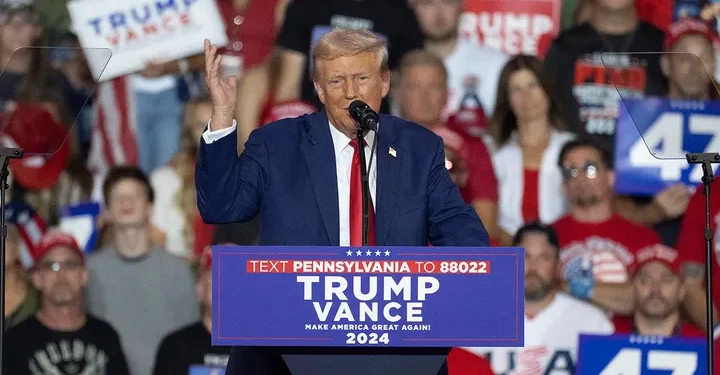As the Democratic National Convention kicked off in Chicago, former President Donald Trump’s campaign launched a strategic counter-programming effort with two prominent Republican senators—Ron Johnson of Wisconsin and Rick Scott of Florida—taking center stage. They focused their criticism on Vice President Kamala Harris, zeroing in on inflation and the economy as key issues.
Speaking from the Trump International Hotel and Tower in Chicago, the two senators highlighted the rising costs of everyday essentials, using charts to emphasize their point. Sen. Johnson set the tone by questioning Harris’ economic proposals, stating, “She doesn’t have a clue.” Both Johnson and Scott emphasized their own business experience, contrasting it with what they described as Harris’ lack of understanding of how businesses operate. “Donald Trump is a business guy who understands how businesses work,” said Scott, further stressing that Harris’ economic policies were out of touch with reality.
The senators specifically criticized the Biden-Harris administration for contributing to inflation. They highlighted Harris’ recent economic platform, which includes a crackdown on corporate “price gouging” in the food industry and plans for the first federal ban on the practice. Harris also proposed expanding the child tax credit and capping prescription drug prices for all Americans, not just seniors. Her agenda also includes a $40 billion fund to support local governments in building more affordable housing and addressing landlord practices.
However, Scott labeled these proposals as “pure socialism,” arguing that price controls have never worked and would lead to more inflation and shortages. He emphasized his preference for a free-market economy, which he believes aligns with Trump’s vision for the country. Johnson echoed these sentiments, criticizing Harris and her running mate, Minnesota Governor Tim Walz, for their perceived lack of understanding of the private sector.
The Trump campaign’s counter-programming was designed to divert attention from the DNC and focus on presenting their alternative vision. Brian Hughes, a senior communication advisor for the Trump campaign, announced plans for daily press conferences at the Trump hotel, featuring various campaign surrogates. The goal, according to Hughes, is to contrast Trump’s transparency with what they see as Harris’ lack of accessibility to the media.
Johnson also called on the media to hold Harris accountable, predicting that she would avoid press conferences ahead of Election Day if possible. He emphasized the importance of transparency, especially given that Harris did not go through a primary process. “The American people need to demand it,” Johnson said, arguing that it’s the “bare minimum” for someone running for the highest office in the land.
Both senators also pointed to the noticeable absence of certain vulnerable Democratic senators from the DNC. Scott speculated that Senators Jon Tester of Montana, Sherrod Brown of Ohio, and Jacky Rosen of Nevada were staying away from Harris to protect their own re-election chances. He suggested that these senators were distancing themselves from Harris because her policies could be detrimental to their states. Johnson added that while these senators may distance themselves publicly, they would likely support Harris’ policies if re-elected.
In summary, the Trump campaign’s strategy in Chicago aimed to present a strong contrast between Trump’s economic vision and what they characterized as Harris’ problematic policies. With daily press conferences planned, the campaign seeks to keep the focus on these issues and away from the Democratic convention.





















Hi i think that i saw you visited my web site thus i came to Return the favore Im attempting to find things to enhance my siteI suppose its ok to use a few of your ideas
Thank you for your sharing. I am worried that I lack creative ideas. It is your article that makes me full of hope. Thank you. But, I have a question, can you help me?
Thank you for your sharing. I am worried that I lack creative ideas. It is your article that makes me full of hope. Thank you. But, I have a question, can you help me?